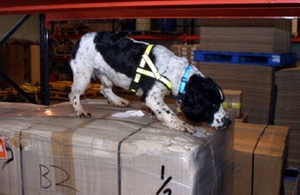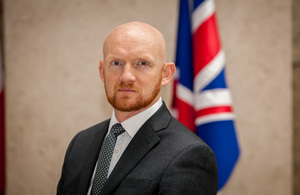- Projects could secure more than 550 jobs, spur growth across the country and save nearly 27.6 million tonnes of carbon emissions
- Further 19 studies receiving funding could one day secure UK lithium production, fast charging technology and a UK-based battery recycling facility
Electric motorcycles and an all-terrain, 4×4 electric delivery truck designed for emerging markets are among the projects benefiting from more than £43 million of government and industry funding to help develop the latest green automotive technology, while seizing on the economic opportunities of the global transition to cleaner transport.
The 2 projects have been awarded funding through the Advanced Propulsion Centre (APC) Collaborative Research and Development competition, which supports the development of innovative low carbon automotive technology and will help propel the UK in the global race to secure electric vehicle supply chains. The projects are:
- Project Zero Emission Norton, Solihull, West Midlands – £17.2 million (£8.5m funding through the APC) to develop an electric motorbike that delivers a high level of race performance and touring range, not only enhancing workforce capabilities and securing local jobs, but helping to strengthen the UK’s competitive supply chain
- OX Delivers CLEAN (Clean Logistics for Emerging African Nations), Leamington Spa, Warwickshire – £17.1 million (£8.5m funding through the APC) to develop an all-terrain electric delivery truck designed for emerging markets and manufactured in the UK that can withstand tough off-road conditions by using long-life, lower cost batteries
The projects are set to secure more than 550 jobs and save 27.6 million tonnes of CO2 – the equivalent of removing the lifetime emissions of 1.1 million cars from the road.
Minister for Investment Lord Grimstone said:
This funding, delivered through the government-backed Advanced Propulsion Centre, will support UK businesses at the cutting edge of the automotive industry to trial the very latest tech, from the development of electric motorbikes to off-road trucks.
Supporting these strategically important technologies lays the path for our electric vehicle sector to compete on a global scale, driving jobs and growth nationwide whilst also creating cleaner, more sustainable modes of transport.
In addition, 19 early-stage proposals that could bolster the UK electric vehicle supply chain have also been awarded funding to research, prove or enhance the case for their scale up, with the potential to create further jobs throughout the country.
The feasibility studies will be backed with £9.4 million in matched government-industry money through the Automotive Transformation Fund (ATF). Areas to be investigated include the development of EV battery components and the viability of using UK-sourced critical minerals.
Studies awarded funding today include:
- Livista Energy Limited, London – Investigating building Europe’s first standalone lithium refining facility capable of producing battery grade lithium
- Nyobolt Ltd, Cambridge – Assessing scale up of the manufacture of high-power battery technology that enables ultra-fast charging without sacrificing the battery’s lifetime or safety
- LTS Transport Solutions, Queenborough – Exploring the potential of opening a brand-new electric vehicle battery recycling plant in the UK by 2024
The ATF was created to accelerate the development of an electric vehicle supply chain, enabling UK-based manufacturers to scale up production in strategically important technologies. The ATF is delivered by the APC to support capital and late-stage R&D investments.
Ian Constance Chief Executive at the APC says:
The projects receiving today’s investment highlight the breadth of technologies needed to help the UK accelerate to net zero emissions. They’re reimagining not just vehicles, but transport in general.
This is the nineteenth round of funding coordinated by the Advanced Propulsion Centre (APC) which supports the development of low carbon emission technologies for cars, buses, heavy goods vehicles, and vans. These projects will help further the UK’s ongoing efforts to develop a sustainable supply chain for manufacturing electric vehicles by 2026.
ATF funding awards for 6-month projects
It also includes 19 ATF funding awards for 6-month projects that will look to research, prove or enhance the business case for scaling up automotive manufacturing or identify where the UK may have a gap to guide a commercial investment strategy. These projects include:
Batteries Anode
Deregallera Ltd – Cardiff, Wales: The APC forecast a significant deficit in locally manufactured anode material over the next decade and Deregallera stand poised to exploit this opportunity by moving to manufacture their sodium-ion anode material at scale in the UK. Large scale investment in chemical plant comes with a high level of risk, that this project reduces by exploring ways to expand the top-down and bottom-up parameters on production quantities, identifying the optimum size of the chemical plant and extending the existing techno-economic study out to 10,000 tonnes-per-annum production.
Echion Technologies – Cambridge, England: Project SHARP (Sprinting towards High-value Anode Roadmap for large-scale UK Production) feasibility study will inform Echion’s high volume anode manufacturing strategy and prepare a roadmap and business case to grow the UK battery manufacturing supply chain and secure the UK’s international competitiveness in the field of advanced battery materials production.
Nyobolt Ltd – Cambridge, England: In this project Nyobolt are defining the requirements for a large-scale manufacturing facility to produce their high-power battery technology for the automotive sector which enables ultra-fast charging without sacrificing lifetime or safety.
Talga Anode – Cambridge, England: This project will look to develop a business case based on feasibility of setting up a downstream graphite-silicon refining plant in the UK.
Batteries – Cathode
Geothermal Engineering – Redruth, England: The project will develop the business case for funding Direct Lithium Extraction (DLE) units to extract lithium from deep geothermal water in Cornwall.
Livista Energy Limited – London, England: Livista Energy is bringing localised, scalable lithium refining capability to Europe. The Livista lithium hub will produce battery grade lithium carbonate and lithium hydroxide both critical to accelerating the energy storage transition in line with global demand.
Northern Lithium Ltd – County Durham, England: Northern Lithium (NLi) wants to prove the economic case to invest more than £120 million over the next 5 to 8 years to establish large-scale, sustainable lithium extraction from brines, processing and supply in the North East of England.
Weardale Lithium Ltd – County Durham, England: The project will identify an investment ready business case for the extraction of lithium from geothermal brines taken from boreholes located at Eastgate, Weardale, County Durham.
Batteries – Cell Assembly
AMTE Power – Dundee, Scotland: AMTE Power – The feasibility study will produce the technical and commercial business case for a high-capacity battery factory.
Industrial Tomography Systems Ltd and University of Birmingham – Manchester, England: ITS’s patented tomography technology has helped improve the manufacturing efficiency in many industrial sectors. At the end of the project, ITS will have a proven tomography system design that can support battery manufacturing processes, aiming to enhance product quality and overall yields. This project will benefit UK gigafactories in developing an efficient production process.
Nanotech Energy, Inc. – US-based battery manufacturer Nanotech Energy (NE) will investigate the viability of expanding its battery production facilities of their patented, high-performing, non-flammable Graphene batteries and other graphene-powered products in the UK.
Ilika Technologies Ltd – Romsey, England: Ilika and the UK Battery Industrialisation Centre are collaborating on this project to carry out an economic feasibility study to assess the costs of creating a dedicated 100 MWh solid-state battery production line within the UKBIC’s facilities.
Batteries – Recycling
Altilium Metals Ltd – Tiptree, England: This feasibility study will accelerate and support the investment decision regarding Altilium Metals developing a new UK greenfield site capable of processing 10,000 MT of end-of-life lithium-ion electric vehicle batteries, gigafactory scrap and electronic waste, enabling 4750 MT of critical cathode metals to be recovered and supplied back into the EV battery industry by 2025. This site is the first of four planned to meet UK demand until 2050.
Talga Anode UK Ltd – Cambridge, England: This feasibility study will evaluate the reuse of spent graphite anode material to produce high surface area graphite and graphene-like materials and develop a business case for further investment in the concept.
LTS Transport Solutions – Queenborough, England: LTS Transport Solutions is exploring the commercial viability of opening a brand-new electric battery recycling plant in the United Kingdom by 2024.
Fuel Cell – MEA and Stack Assembly
Bramble Energy Ltd – Crawley, England: The PCBFC ™ Range Extender feasibility study will develop a robust and detailed business case to manufacture the printed circuit board fuel cell (PCBFC™) for the automotive sector in the UK.
Jaguar Land Rover Ltd and Johnson Matthey Hydrogen Technologies Ltd – Coventry, England: The ARES feasibility study project is investigating the potential for a UK automotive supply chain to scale-up and manufacture competitive high value on-vehicle hydrogen and fuel cell technologies, including the use of semi-finished electrochemical parts produced in the UK.
Adelan Ltd, Ant Industries Ltd and the Manufacturing Technology Centre – Birmingham, England: The feasibility study examines the practicalities and cost-benefits of scaled manufacturing of a fuel cell in the UK.
Power Electronics
INEX Microtechnologies Ltd – Newcastle-upon-Tyne, England: This project will allow Inex to fully investigate and develop plans for the business that maximise the opportunity available in the automotive sector for a UK based supplier of Compound Semiconductor devices particularly focused on gallium nitride.
Quotes from the APC19 winners
Simon Davis, Managing Director, OX Delivers said:
Developing a truck for Pay-As-You-Go service requires a completely different approach compared to a traditional vehicle. The Advanced Propulsion Centre have been brilliant champions of OX Delivers as we progressed our first electric truck.
As a UK business we are delighted to be awarded further support to work in partnership with large and small-scale businesses and lead the decarbonisation of emerging market transport using the latest Industry 4.0 technology and UK EV expertise. This award reinforces OX’s game-changing vision for emerging markets and is more exciting momentum for our innovative and dynamic automotive start-up.
Robert Hentschel, CEO Norton Motorcycles said:
Over the last year and a half, we have invested in rebuilding Norton to its innovative, challenging and pioneering heyday. That spirit of innovation will ensure our future electric models provide riders with unparalleled performance that closes the gap between ICE and EV motorcycles by making them comparable in every respect.
But we want to lead, not follow and by assembling this team of partners that share our pioneering spirit, we will expand Norton’s capability while gaining knowledge and experience to produce industry leading electric motorcycles that are designed and manufactured in the UK.
About the Advanced Propulsion Centre UK
The Advanced Propulsion Centre (APC) collaborates with UK government, the automotive industry and academia to accelerate the industrialisation of technologies, supporting the transition to deliver net-zero emission vehicles.
Since its foundation in 2013, APC has funded 172 low-carbon projects involving 410 partners, working with companies of all sizes, and has helped to create or safeguard nearly 50,000 jobs in the UK. The technologies developed in these projects are projected to save over 297 million tonnes of CO2, the equivalent of removing the lifetime emissions from 12 million cars.
With its deep sector expertise and cutting-edge knowledge of new propulsion technologies, APC’s role in building and advising project consortia helps projects start more quickly and deliver increased value. In the longer term, its work to drive innovation and encourage collaboration is building the foundations for a successful and sustainable UK automotive industry.
In 2019 the UK government committed the Automotive Transformation Fund (ATF) to accelerate the development of a net-zero vehicle supply chain, enabling UK-based manufacturers to serve global markets. ATF investments are awarded through the APC to support strategically important UK capital and R&D investments that will enable companies involved in batteries, motors and drives, power electronics, fuel cells, recycling, and associated supply chains to anchor their future.

